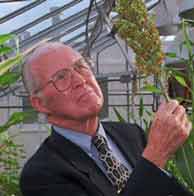The plant scientist, who died September 12, won the Nobel Peace Prize for the 1970 Green Revolution. But world hunger is rising again.
This the VOA Special English Agriculture Report.
Norman Borlaug led what was known as the Green Revolution. As a plant scientist, he may have saved more lives than anyone else in history -- as many as a billion, by some estimates. He traveled the world to help poor people develop better ways to produce food.

He worked in the fields to show farmers new ways to grow wheat, rice and other crops. And he worked in the laboratory to breed new wheat varieties that could resist disease. Lately he worried about a new threat, a fungus called Ug99. It was discovered in Uganda ten years ago and has spread in Africa and now Asia.
NORMAN BORLAUG: "This is a new strain of stem rust organism that has the power to destroy most of the wheat varieties being grown around the world."
Norman Borlaug taught at Texas A&M University and worked on international projects until not long before his death on September 12th. He was 95 and suffering from cancer.
In 1944 he began work on a project in Mexico financed by the Rockefeller Foundation. By the middle of the 1950s, Mexico had doubled its wheat production per hectare.
Norman Borlaug and his team had even greater success in Pakistan and India. Farmers could grow four times more wheat than before. Later in life he tried to bring the Green Revolution to Africa.
He won the Nobel Peace Prize in 1970 and the Presidential Medal of Freedom seven years later. He won the Congressional Gold Medal two years ago.
But not everyone considered him a hero. Environmental activists criticized his intensive methods, including the use of fertilizers and pesticides. He suggested that Western critics had never known real hunger, and wondered if they had ever watched their children go hungry. But later, he also urged farmers not to overuse chemicals.
At his 95th birthday party in March, Norman Borlaug told VOA that he was worried about the world's ability to feed itself.
NORMAN BORLAUG: "We are adding 84 million people to the population every year. We have a big job on our hands."
World hunger has been rising slowly since the late nineties. A big increase is expected this year because of the economic crisis, combined with higher food prices.
The World Food Program said last week that the number of hungry people will pass one billion this year for the first time in history. But the United Nations agency says the flow of food aid is at a 20-year low.
And that's the VOA Special English Agriculture Report, written by Jerilyn Watson. I'm Bob Doughty.
Related stories:
Green Revolution hero Norman Borlaug dies at 95
Food crisis could push millions of people into poverty
Calls for a 'Gene Revolution'
Growing crops with less water
(Source: VOA 英語點津編輯)